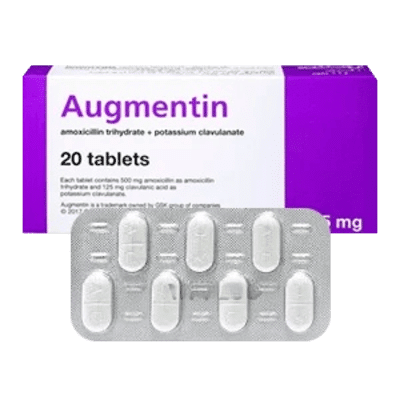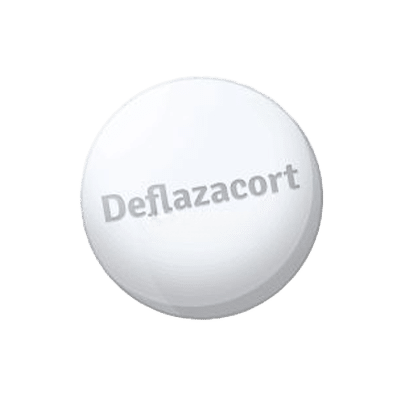
Augmentin
3 customer reviewsWhat is it?
Augmentin is a broad-spectrum antibiotic used to combat a variety of microorganisms, including both aerobic and anaerobic gram-positive and gram-negative bacteria. The main active ingredient is potassium clavulanate, which provides resistance to bacteria that produce beta-lactamases – enzymes that destroy penicillin. This drug is prescribed for the treatment of diseases such as pneumonia, respiratory, gastrointestinal and urogenital tract infections, as well as infectious complications after surgical interventions.
Composition
Augmentin contains components that together provide high effectiveness of the drug in the fight against infections. The main active ingredient is potassium clavulanate.
- Amoxicillin is an antibiotic that is a derivative of penicillin and inhibits the synthesis of the bacterial cell wall.
- Potassium clavulanate is a beta-lactamase inhibitor that prevents the destruction of amoxicillin and provides its protection.
- Additional excipients, such as magnesium stearate and crospovidone, which improve the absorption of the drug and its stability.
This combination of components provides Augmentin with reliable protection against various infections and resistance to bacteria protected by beta-lactamases.
How to use?
Correct use of Augmentin is extremely important to achieve the desired effect and minimize the risk of side effects. The dosage of the drug is determined individually depending on the severity of the infection, its location and the sensitivity of the pathogen. It is important to maintain equal intervals between doses to maintain a stable concentration of the antibiotic in the blood.
- Take Augmentin tablets whole with water. If necessary, the tablets can be ground into powder and dissolved in water if difficult to swallow.
- Do not take the drug in larger quantities or for a longer period of time than prescribed by your doctor to avoid side effects.
- If you miss a dose, take it as soon as possible, unless it is time for the next dose. Do not double the dose to compensate for the missed one.
Following these recommendations will help you use Augmentin as effectively as possible and minimize the risk of adverse processes.
How does it work?
Augmentin works using two key components: amoxicillin and potassium clavulanate, which together create a powerful formula to fight bacterial infections. Amoxicillin, as one of the semi-synthetic penicillins, acts by blocking the synthesis of the bacterial cell wall, which leads to their death. However, many bacteria have developed defense mechanisms, in particular, the production of beta-lactamase enzymes that destroy these antibiotics.
And this is where potassium clavulanate comes in, acting as an inhibitor of these enzymes. This substance protects amoxicillin from destruction, allowing the latter to perform its antimicrobial function more effectively. This synergy of components makes Augmentin effective against even those bacteria that are resistant to other penicillin antibiotics. Opening access to the treatment of a wide range of infections, this drug remains an integral part of modern medicine.
Indications
Augmentin is indicated for the treatment of a variety of bacterial infections and its widespread use is due to its effectiveness against a wide range of pathogens.
- Respiratory infections, including sinusitis, bronchitis and pneumonia.
- Skin and soft tissue infections, such as abscesses and cellulitis.
- Urological infections, including cystitis and pyelonephritis.
- Gynecological infections and infectious complications after surgical interventions.
- Bone and joint infections, such as osteomyelitis.
Due to the broad spectrum of activity of the drug, Augmentin is often the preferred treatment option in cases where the infection is caused by bacteria resistant to other antibiotics.
Contraindications
For safe use of Augmentin, it is important to consider contraindications that may limit its use.
- Allergy to penicillin or other components of the drug - taking Augmentin can cause serious allergic reactions.
- Little liver or kidney function - in these conditions, careful use of the drug and constant monitoring of the patients condition is required.
- Mononucleosis - the use of Augmentin for this infection can increase the risk of developing skin rashes.
- Pregnancy and lactation - use may be limited, especially during the third trimester of pregnancy.
If any of these factors are present, it is important to consult a doctor before starting to take the drug.
Side effects
Like any other antibiotic, Augmentin can cause side effects that can range from mild to more serious.
- Gastrointestinal disorders such as nausea, vomiting, diarrhea, and abdominal pain.
- Allergic reactions such as skin rashes, itching, or hives.
- Liver dysfunction such as jaundice or other disorders.
- Headaches and increased anxiety may result from taking it.
- Changes in blood composition that your doctor may detect during testing.
If any of these symptoms occur, it is important to immediately consult your doctor to adjust your treatment or discontinue the drug.
Frequently asked questions
Reviews and Experiences
I used Augmentin to treat a throat infection. I felt significant relief after just a couple of days. The drug was effective and did not cause me any side effects. However, I had to take the pills on time and according to the schedule for the entire course of treatment.
After the surgery, the doctor prescribed Augmentin to prevent infections. I was a little worried about a possible allergy, but fortunately everything went smoothly. No infection symptoms developed, and none of the side effects appeared either. The drug met my expectations.
My daughter took Augmentin to treat an ear infection. The first improvements were noticeable the next day. The drug was gentle and did not cause discomfort. The only thing to remember was to monitor the time intervals between doses.



